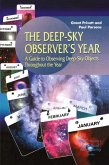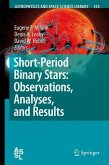Contents: Introduction.- The Stars of the Almagest.- Accusations.- The Rehabilitation of Ptolemy.- The Analysis of the Star Catalogue.- Structures in Ptolemy's Star Catalogue.- Theory and Observation.- Appendix A.- Stars and Constellations.- Identifications.- Appendix B.- Transformation Formulae.- Column Headings.- Appendix C.- Column Headings.- Literature.- Index.
Ptolemy's Almagest shares with Euclid's Elements the glory of being the scientific text longest in use. From its conception in the second century up to the late Renaissance, this work determined astronomy as a science. During this time the Almagest was not only a work on astronomy; the subject was defined as what is described in the Almagest. The cautious emancipation of the late middle ages and the revolutionary creation of the new science in the 16th century are not conceivable without reference to the Almagest. This text lifted European astronomy to the high standard of knowledge on which the new science flourished. Before, the Ptolemaic models of the orbits of the sun, the moon, and the planets had been refined by Arabic astronomers. They provided the structural elements with which Copernicus and Kepler ushered in the era of modern astronomy. The Almagest survived the destruction of its epicyclic representation of the planetary orbits in the conceptual traces left behind in the theories of its successors. The clear separation of the sidereal from the tropical year, the celestial coordinate systems, the concepts of time, the forms of the constellations, and brightness classifications of celestial objects are, among many other things, still part of the astronomical canon even today.
Ptolemy's Almagest shares with Euclid's Elements the glory of being the scientific text longest in use. From its conception in the second century up to the late Renaissance, this work determined astronomy as a science. During this time the Almagest was not only a work on astronomy; the subject was defined as what is described in the Almagest. The cautious emancipation of the late middle ages and the revolutionary creation of the new science in the 16th century are not conceivable without reference to the Almagest. This text lifted European astronomy to the high standard of knowledge on which the new science flourished. Before, the Ptolemaic models of the orbits of the sun, the moon, and the planets had been refined by Arabic astronomers. They provided the structural elements with which Copernicus and Kepler ushered in the era of modern astronomy. The Almagest survived the destruction of its epicyclic representation of the planetary orbits in the conceptual traces left behind in the theories of its successors. The clear separation of the sidereal from the tropical year, the celestial coordinate systems, the concepts of time, the forms of the constellations, and brightness classifications of celestial objects are, among many other things, still part of the astronomical canon even today.
"Grasshoff presents a detailed study of the catalog starting with its history and then details the various controversies over the catalog from Tycho through Dreyer and R.R. Newton. His analysis considers such questions as precession and solar theory, the methods of observations, and the internal errors of the catalog. The author concludes that Hipparchus' observations were incorporated into the Ptolemaic catalog but that Ptolemy, in the absence of any understanding of how to treat errors of observation, selected from a variety of observations those that best fit his theory. Charts of all the Ptolemaic stars and a catalog of their modern identifications are given." -Choice "The author's purpose is to lay to rest an argument which has blazed for several centuries, the question at issue being this: did or did not Ptolemy plagiarize (from Hipparchus) some of his data, and fabricate some of rest? The author begins with a detailed review of the history of the argument, turns then to a close examination of the data itself, and concludes that the charges which have been brought against Ptolemy are rooted in anachronism and in misunderstanding of his scientific objectives. One of several appendices provides modern identifications of the stars which appear on Ptolemy's list. Very carefully argued and produced, with detailed references, many figures. Sensible, useful...but quite unlikely to achieve its objective." -Book News









